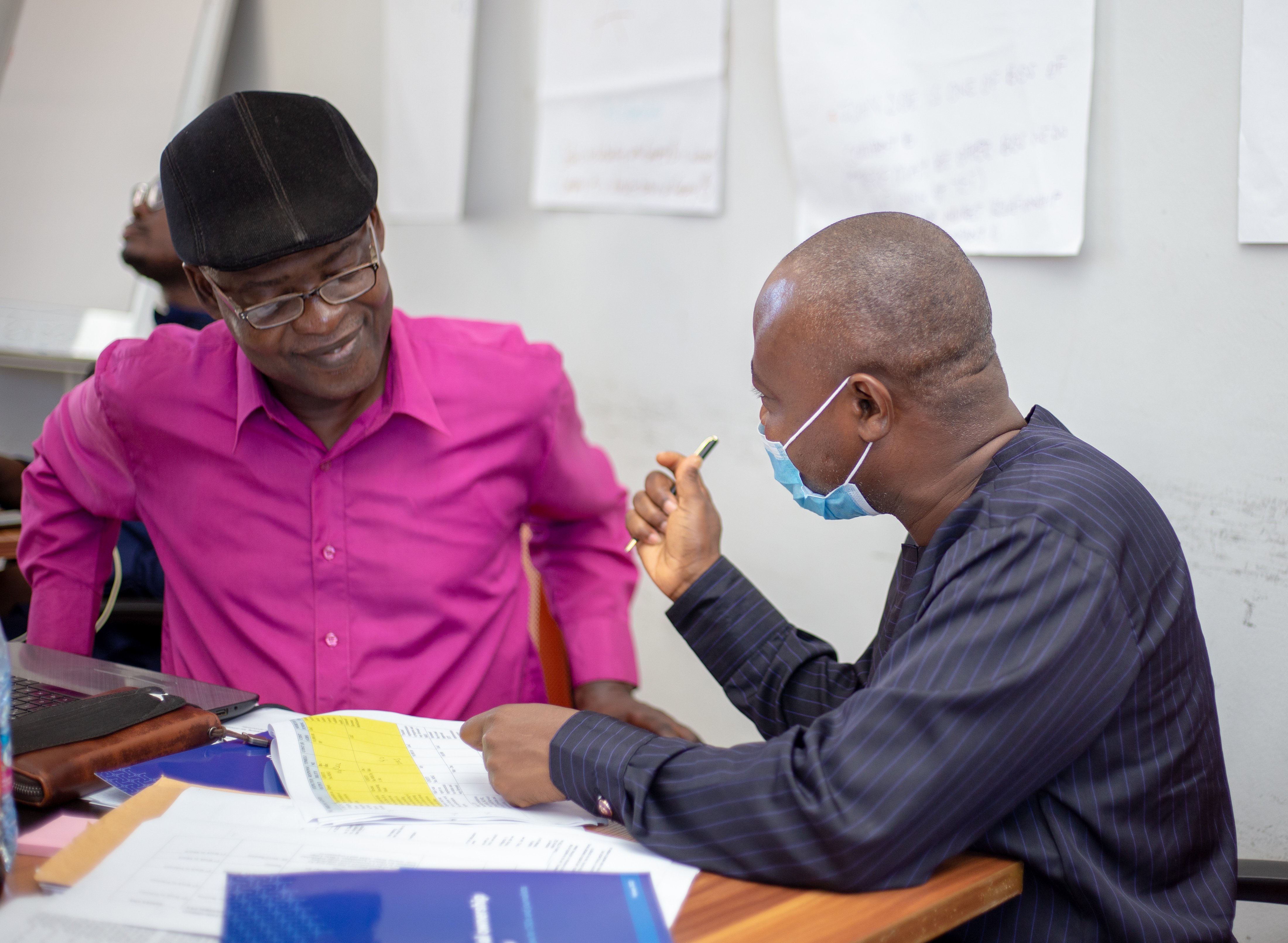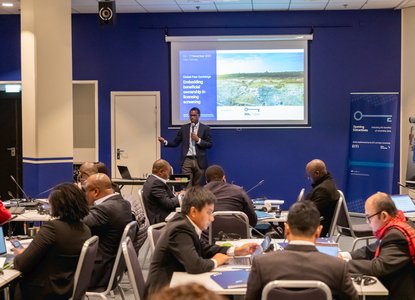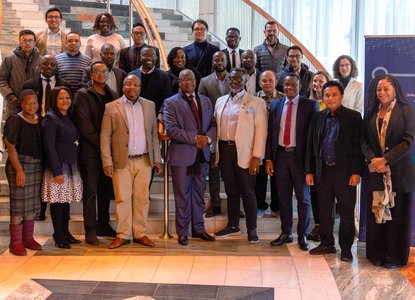Using beneficial ownership data in Zambia: Capacity-building sessions for CSOs and journalists

The Opening Extractive programme invites Zambia-based journalists, civil society, and activists to join a free training course on the use of beneficial ownership information to improve natural resource governance in Zambia.
The capacity-building sessions will be held over three days (June 22-24), in Lusaka, and participation costs will be reimbursed.
Deadline for applications is May 31, 2022.
Background of beneficial ownership data in Zambia
To improve the governance of natural resources, Zambia joined the Extractives Industries Transparency Initiative (EITI) in 2009 and became compliant as an implementing country in 2012. Since then, Zambia has produced 13 EITI reports covering the fiscal years between 2008-2020. Zambia EITI reports have included much significant information related to transparency in the extractives sector, such as revenues, contracts, production and crude oil sales.
In November 2017, even before the EITI’s made such requirements, the Government of Zambia amended the Companies Act to require beneficial ownership (BO) disclosure from registered companies. The government finalised regulations for the implementation of the legislation in March 2019 and subsequently amended the Companies Act in 2020 to expand the definition of a beneficial owner and clarify key terms. In 2020, EITI countries participating were required to disclose the beneficial owners of mining, oil and gas companies. Hence Zambia has made meaningful progress in ensuring transparent management of the extractives sector.
However, despite the political commitment and progress to institutionalise disclosure of beneficial owners, existing information is not yet fully publicly available, nor has it been analysed by data users interested in the field. Opportunities therefore remain to maximise the impact of BO by improving the quality of data which is disclosed, and the accessibility and usability of the information.
The Opening Extractives programme
The Opening Extractives (OE) programme is a global initiative aiming to transform the availability and use of BO data for effective governance in the extractive sector. The programme combines political and technical engagement to support countries implementing BO reforms, and to enable the use of data by governments, civil society and companies.
In December 2021, the Government of Zambia joined the OE programme. Through participation in the programme, the Government is committing to improve corporate ownership disclosure. The programme will enable improved access to quality BO data, which will strengthen accountability and improve the governance of energy and mining revenues, whilst also supporting business and curtailing corruption and illicit financial flows.
Capacity-building sessions
The OE programme, in collaboration with the Zambia's Extractive Industries Transparency Initiative, the Patents and Companies Registration Agency, and Publish What You Pay Zambia, is organising capacity-building sessions. The programme invites Civil Society Organisations (CSOs) and journalists to learn about the importance of quality and timely beneficial ownership data, and share skills, tools and methodologies to analyse and use the data. The sessions aim to strengthen the capabilities of course participants to analyse and utilise BO data, which will improve natural resources advocacy and governance in Zambia.
Objectives
- Raise awareness amongst local stakeholders on the importance of accessible and timely BO data, and build local capacity in advocacy and data analysis;
- Train journalists, CSOs and activists on BO concepts, definitions and thresholds, the current data available and how it could be used for investigation;
- Build a network of interested stakeholders who use BO data for their work and research; and
- Provide practical user-focused feedback to the PACRA and ZEITI on the options for strengthening high-quality data collection and improving useability of BO data disclosure.
Expected outcomes
- CSOs, journalists and activists familiarise themselves with Zambia’s legal framework for beneficial ownership transparency (BOT); gain the ability to differentiate legal owners from beneficial owners, understand the basis for existing complexities in different types of company ownership structures and associated risks;
- CSOs, journalists and activists gain skills to identify and analyse BO data, together with other publicly-available information, which can inform their investigations, advocacy analyses and journalistic reportage.
Outline
The capacity-building sessions will be run over three full days. Sessions will be led by the Opening Extractives team, in partnership with the ZEITI and Publish What You Pay, and with expert support from experienced journalists and research/advocacy analysts.
- Day 1 (June 22): Demystifying beneficial ownership. This session is intended to set the scene of BOT in Zambia and provide some political and economic background on the topic. We will also focus on presenting the basics of BO concepts, providing a general understanding of BO disclosure and the underlying reasons for the global wave of increased BO disclosure.
- Day 2 (June 23): Zambia’s progress towards BOT in the extractives sector. This session is intended to share Zambia’s current status regarding beneficial ownership transparency, deliver understanding of how data is structured, stored and published, and how to analyse a company’s declaration form. Additionally, we will discuss the importance of BOT in the extractives value chain and what key data sources are available in the country.
- Day 3 (June 24): Accessing and using BO information. This session is intended to provide participants with targeted skills on how to apply BO information and analysis within their respective field. We will introduce tools for data analysis and explore national and international data sources that can be combined with BO information for maximum effect.
How to apply
Any individual working in a CSO or media centre, independent journalists, or active citizens interested in the topic of company ownership/control, natural resources governance, illicit financial flows or related governance and business reporting or research, can apply to take part in the capacity-building sessions.
We will provide certificates of attendance to all participants that join the three sessions in full. We will also reimburse travel and accommodation costs for those needing it.
Selection criteria for participants:
- A background knowledge in public policy or a relevant field or governance issue.
- Experience in working within or reporting on Zambia’s legal and policy framework which governs the business sector. Prior experience on beneficial ownership, corporate structures, illicit financial flows or related issues in the context of Zambia’s mineral, oil and gas sector is an advantage.
- Availability (and organisational approval if applicable) to take part in the three sessions in full.
- Strong interpersonal skills: an openness and eagerness to collaborate with other groups and individuals (not just local CSO groups, but with donors, government, companies and consultants).
- Experience or interest in strengthening the capacity for BO data use amongst other interested colleagues.
- Advanced English written and verbal communication skills.
To apply, please complete this online form by May 31, 2022.
Important dates
- May 10th: Opening of the call for applications
- May 31st: Deadline to submit applications
- June 10: Confirmation of selected applicants
- June 22, 23 & 24: Capacity building workshops
Related articles and publications
Publication type
News article
Country focus
Zambia
Topics
Opening Extractives
Sections
Impact
Open Ownership Principles
Access


